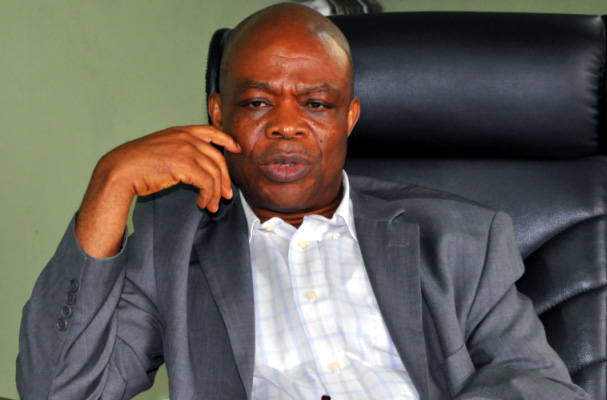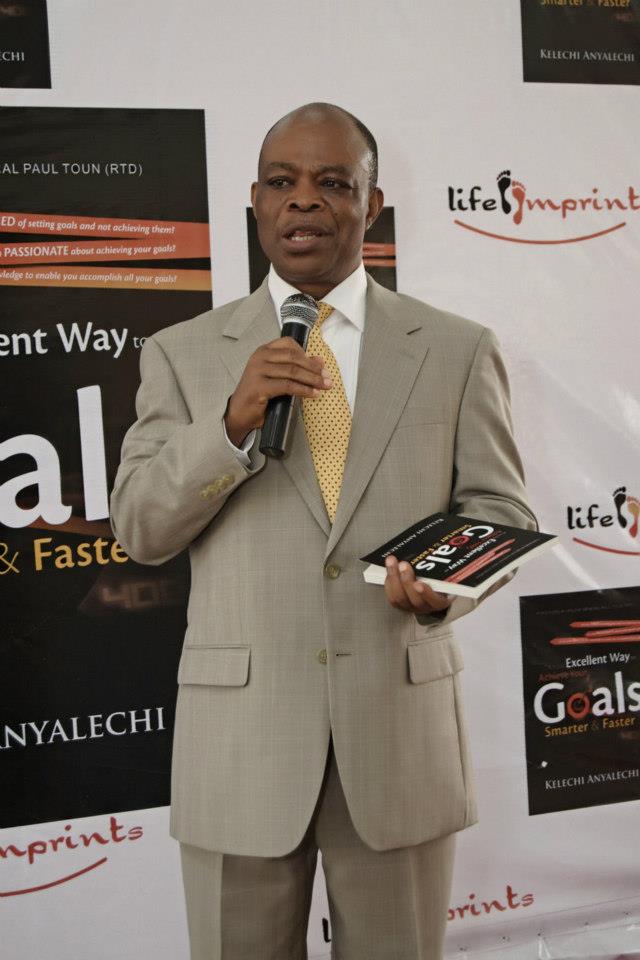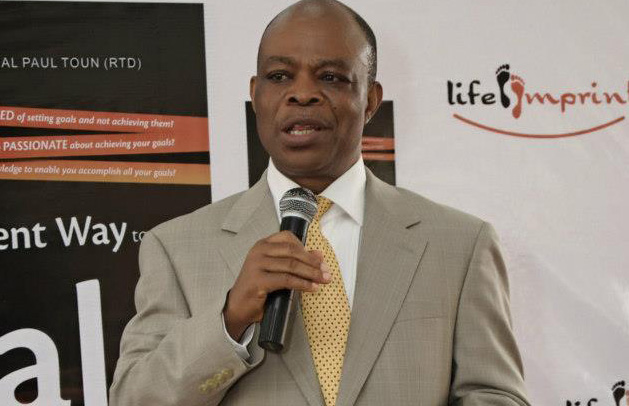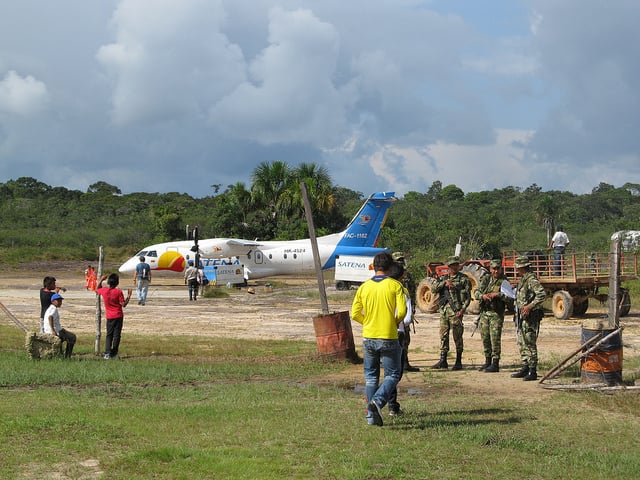Journalist and celebrated columnist, Pastor Dimgba Igwe, was killed on Saturday morning by a hit-and-run motorist while jogging near his residence in Okota, Lagos.
Igwe, vice-chairman of the editorial board of Sun Newspapers, was a regular early-morning jogger, according to his friends.
He was the deputy general overseer of Evangel Pentecostal Church (EPC), Lagos.
Although the motorist ran away, Igwe was eventually taken to the hospital where he underwent emergency surgery before passing away.
Advertisement
He was born on May 16, 1956.
Reproduced below is his last column published in Daily Sun on September 2, 2014
Advertisement
From Katsina with Ibrahim Shema’s good tidings
Originally, it was said the fear of God is the beginning of wisdom. But nowadays, Nigerians have paraphrased that powerful scripture to the fear of Boko Haram is the beginning of wisdom. So, when the Nigerian Guild of Editors announced that this year’s All Nigeria’s Editors’ Conference, ANEC, was going to hold in Katsina, the question was, why Katsina of all places? Or anywhere in the North for that matter!
The way everyone, including this reporter, reacted, you’d think that the Guild was planning to hold the conference in Chibok town, near the evil forest of Sambisa. “Are we safe?” I had asked the Guild President, Femi Adesina. It turned out that it was the question on every lip and Femi had answered it so many times already.
“Katsina is said to be the safest part of the North,” he explained. But it was when I heard that the issue had become so contentious that the northern delegates, who had faithfully attended three or more consecutive annual conferences in the South threatened to pull out of the Guild if the venue was changed that I made up my mind to be there, perhaps, as the disciples of Jesus said at the Lord’s most harrowing hour, “let us go there and die together.”
But far from dying, Katsina offered us a beacon of hope and good things. To avoid landing in Kano and the attendant logistic challenge of travelling to Katsina from Kano, delegates from Lagos and Abuja had a chartered Boeing 737 flight to take us straight to Katsina en route Abuja.
Advertisement
I was last at Katsina in 1991 with a couple of other journalists that included the then NTA’s Chris Anyanwu and we had come for project inspection during the regime of Military Administrator, Col. John Madaki. Katsina, home to the famous Yar’Adua dynasty and former head of state, Gen. Muhammadu Buhari (from Daura), then was a low-key urban town with limited roads and other infrastructures. Then, we inspected mostly boreholes, rural roads, schools, clinics and electrification. The contrast today is very stark. Katsina today is a very modern city, with good roads. We now drove through a new city paved with a six-lane ring road on both sides around Katsina town with made-in-Katsina solar-powered street lights. But, as we piled into buses at the airport, my eyes were alert. Where are the armed security squads to protect us in case? There were none. I’ve gone to many places in the South here where we were escorted by armed security, but not in Katsina. At the large Liyafa Palace Hotel where all the Fellows of the Guild were lodged in suites, not even a single policeman was visible – just, plain private civilian security guards, the type you have in your homes.
The first night, I was thinking, what if Boko Haram hear that editors are in Katsina, wouldn’t we be a great target of the terrorists to draw global attention? But as it turned out, Katsina is a very peaceful state, with no security concerns. Indeed, when we drove from the airport to the Government House for a brief welcome reception with the State Governor, Ibrahim Shema, and his cabinet members, we encountered minimal security. After our registration for the conference the next day, the soldier manning the conference hall suggested that we drop our conference bags with him and collect it after the opening ceremony ostensibly because the Governor, the Senate President, the Minister of Education and other top dignitaries were expected, but surprisingly, I was able to convince him easily to allow us in with our bags because it would be too difficult for each person to retrieve their bags afterwards since the bags are uniform! Such sensible ease speaks about the ambience of peace and security of Katsina.
Over 200 editors besieged Katsina town, stretching their hotel infrastructure. We had come to explore a theme, Credible Elections and Good Governance: The Role of the Editor. We were exploring the foundation of credible elections and good governance. Apart from the keynote address by Alhaji Umaru Muttallab, other papers were presented around this theme by INEC Chairman, Prof. Attahiru Jega, legal activist, Ms Ayo Obe, media icon, Ray Ekpu, plus an interactive executive session with host governor, Ibrahim Shema, representatives of Lagos State Governor, Tunde Fashola, and Bayelsa State Governor, Henry Dickson.
Good governance or credible elections, which drives the other? Papers and debates went back and forth. I was one of the three discussants of the keynote address by Muttallab – my co-discussants were NTA’s Director-General, Shola Omole (represented by NTA’s Executive Director of News, Shola Atere), and Professor Umar Pate. I concluded by arguing that good governance, to a great extent, should drive credible election. Since June 12, 1993, the average Nigerian voters had demonstrated time and again their willingness to deliver free and fair elections, it is the political class that is dragging the electorate backwards with election riggings and instigation of violence. But where the elected office holders perform well in office, they don’t need to induce people with “stomach infrastructure”, rig elections or resort to violence to win elections. The average Nigerian electorate would fight to return them to office.
Advertisement
As it turned out, the performance of Governor Shema in office became a good illustration of that point, an excellent case study in how good governance can drive credible elections. Shema shared his story both at the executive session with all the editors and at a private session with five elders of the Guild of which I was present.
When he came to power in 2007, he inherited N54 billion of awarded contracts obligations. The Nigerian tradition is usually to abandon those contracts, refuse to pay for them and then proceed to award your own contracts. But Shema, convinced that government is continuity, spent the first 18 months of his tenure, completing all the projects started by his predecessor and paying off the N54 billion. This of course, put him at odds with his supporters and powerful stakeholders, who wanted him to award fresh contracts. Some of those contracts included the Katsina airport where we landed, the completion of Katsina State University and Polytechnics, among other things.
Advertisement
Incidentally, it was in the area of education that Governor Shema seemed to have spectacularly excelled. On coming to power, he visited some schools and found them deserted – the pupils had been sent home because they could not pay school fees. Worried by what he saw, Shema calculated the total revenue that accrued from school fees in the state and was told they came to N450 million per annum. Shema then reckoned that if merely he saved N100 million monthly from the state’s monthly allocation of N2.8 billion then, he would save N1.2 billion a year. With that simple arithmetic, Shema then offered free education in the state from primary to tertiary level. The state government also pays for all exam fees like those of WAEC, JAMB, etc.
But it is not only that students from Katsina State are offered education free, Shema’s administration has offered scholarships to about 700 indigenes of the state to study abroad, all expenses paid. But the condition is that they must study science-based courses like medicine, pharmacy, engineering courses, especially aeronautical, environmental engineering, etc.
Advertisement
The story of an orphan boy from Funtua stood out. Thanks to free education by the Shema administration, the boy was able to make straight A’s in all his subjects. But then, he secured a job in the farm of a rich man where his singular duty was carrying fertilizers on a donkey. When Shema heard of his pathetic story, he offered him scholarship to the University of California to study Environmental Engineering. This year, the orphan graduated with First Class honours and won a prize, as the overall best graduating student. He is back for his youth service but before then, with tears in his eyes, he presented his prize to the governor.
In Katsina, the duty of husbands stops with impregnating their wives. After that, the state government takes over all delivery cost, even if it is caesarian section and the child enjoys free medical care until age five. All malaria treatment and dialysis or renal treatments are free while oldies enjoy fee medical care.
Advertisement
Governor Shema inherited a decrepit and leaky Government House from his predecessor, but today, he has built an ultra-modern Government House complex that rivals any in the country.
But the news is not the building of the Government House but how he funded it. His policy is that before he awards contracts, there must be total cash backing. He pays 40 per cent of the contract sum as mobilisation fee and invests 60 per cent in treasury bills and other financial instruments until the final execution. After three-year tenure, Shema was shocked to discover that the state had garnered a huge income of N10 billion from such investments. It was out of this income from the investments that he spent N8 billion to build and furnish the Government House complex and spent another N400 million to build official Government Lodge at Abuja. “This Government House was not built out of the state’s allocation or IGR,” he said. “It is almost free of charge to the government because there is no law that compels me to invest government money in the first place.”
How much did the six-lane ring road cost? Well, according to Governor Shema, Julius Berger quoted N37 billion for less than one-third of the ring road and declined to make any discount. Realising he could not afford to execute the entire project at that rate, Shema then got consultants, who provided him with bill of quantity and then Shema dared five of us, “Can any of you guess how much we eventually built the entire ring road?”
“May be N15 billion?” Ray Ekpu finally guessed.
Wrong. Wide off the mark! “We eventually built the whole of the six-lane ring road for N6 billion! People don’t believe me but that is the truth!”
In all his exploits, Shema wants it underscored that he has never borrowed a dime. All his projects are executed from the state’s federal allocation of N5 billion and N1 billion IGR.”
Yet, the state is not owing workers or pensioners. Yet, the state has a healthy cash balance of over N32 billion and about N20 billion in local government account. Perhaps, it is high time Shema conducted a tutorial on prudence and management of state resources to many of his colleagues, who have left a legacy of squandermania with nothing to show for it.
Add a comment







